祈使句,反意疑问句和感叹句
- 格式:ppt
- 大小:166.00 KB
- 文档页数:38
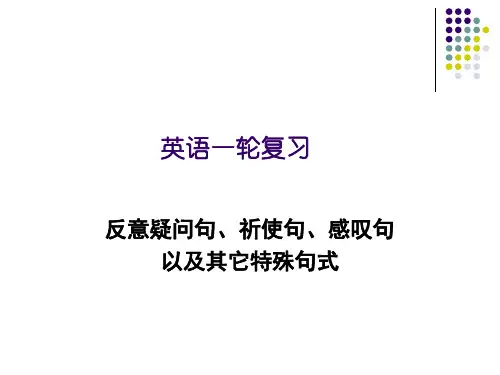
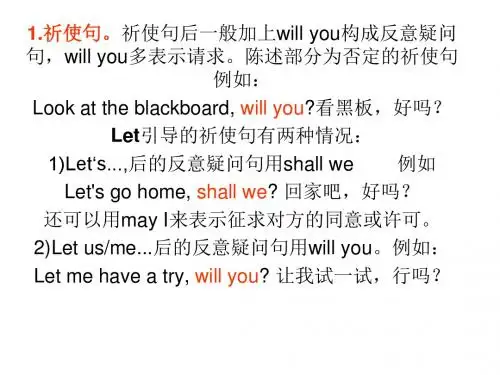
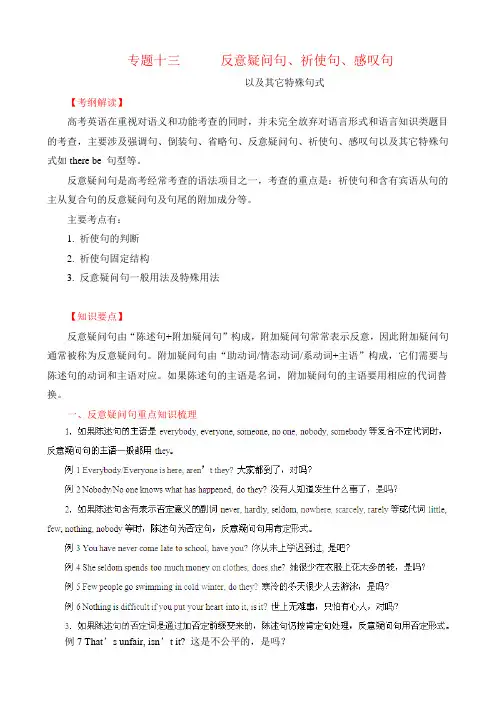
专题十三反意疑问句、祈使句、感叹句以及其它特殊句式【考纲解读】高考英语在重视对语义和功能考查的同时,并未完全放弃对语言形式和语言知识类题目的考查,主要涉及强调句、倒装句、省略句、反意疑问句、祈使句、感叹句以及其它特殊句式如there be 句型等。
反意疑问句是高考经常考查的语法项目之一,考查的重点是:祈使句和含有宾语从句的主从复合句的反意疑问句及句尾的附加成分等。
主要考点有:1. 祈使句的判断2. 祈使句固定结构3. 反意疑问句一般用法及特殊用法【知识要点】反意疑问句由“陈述句+附加疑问句”构成,附加疑问句常常表示反意,因此附加疑问句通常被称为反意疑问句。
附加疑问句由“助动词/情态动词/系动词+主语”构成,它们需要与陈述句的动词和主语对应。
如果陈述句的主语是名词,附加疑问句的主语要用相应的代词替换。
一、反意疑问句重点知识梳理例7 That’s unfair, isn’t it? 这是不公平的,是吗?例8 The meeting is unimportant, isn’t it? 这个会议不重要,对吗?4.如果陈述句是“I’m…”结构时,反意疑问句用aren’t I。
例9 I’m a good student, aren’t I? 我是一个好学生,对吗?例10 I’m going to attend your lecture, aren’t I? 我打算听你的讲座,好吗?5.如果陈述句是“There be”句型,反意疑问句也借助there。
例11 There is a tall tree in front of your house, isn’t there? 你家房前有一棵大树,是吗?例12 There used to be a bus stop near our school, usedn’t there/didn’t there? 我们学校附近曾经有一个汽车站,对吗?例13 There stands an old temple on the top of the mountain, doesn’t there? 山顶矗立着一座古庙,是吗?6.如果陈述句的主语是one,反意疑问句的主语在正式场合用one, 在非正式场合用you。
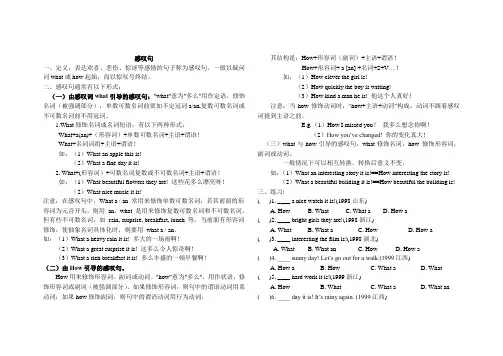
感叹句一、定义:表达欢喜、悲伤、惊讶等感情的句子称为感叹句。
一般以疑问词what或how起始,而以惊叹号终结。
二、感叹句通常有以下形式:(一)由感叹词what引导的感叹句:"what"意为"多么"用作定语,修饰名词(被强调部分),单数可数名词前要加不定冠词a/an,复数可数名词或不可数名词前不用冠词。
1.What修饰名词或名词短语,有以下两种形式:What+a(an)+(形容词)+单数可数名词+主语+谓语!What+名词词组+主语+谓语!如:(1)What an apple this is!(2)What a fine day it is!2. What+(形容词)+可数名词复数或不可数名词+主语+谓语!如:(1)What beautiful flowers they are! 这些花多么漂亮呀!(2)What nice music it is!注意:在感叹句中,What a / an 常用来修饰单数可数名词,若其前面的形容词为元音开头,则用an。
what 是用来修饰复数可数名词和不可数名词。
但有些不可数名词,如rain, surprise, breakfast, lunch 等,当前面有形容词修饰,使抽象名词具体化时,则要用what a / an,如:(1)What a heavy rain it is! 多大的一场雨啊!(2)What a great surprise it is! 这多么令人惊奇啊!(3)What a rich breakfast it is! 多么丰盛的一顿早餐啊!(二)由How引导的感叹句。
How用来修饰形容词、副词或动词。
"how"意为"多么",用作状语,修饰形容词或副词(被强调部分)。
如果修饰形容词,则句中的谓语动词用系动词;如果how修饰副词,则句中的谓语动词用行为动词,其结构是:How+形容词(副词)+主语+谓语!How+形容词+ a [an] +名词+S+V… !如:(1)How clever the girl is!(2)How quickly the boy is writing!(3)How kind a man he is! 他这个人真好!注意:当how修饰动词时,“how+主语+动词”构成,动词不跟着感叹词提到主语之前。

祈使句、感叹句、反义疑问句一、祈使句1.肯定句用动词原形,否定用Don't / Never +动词原形。
Be quite , please!Never be afraid of it!点津:祈使句的其他否定形式:①否定不定式Be sure not to be late.②no + 动名词构成简短否定祈使句No smoking !No talking!③直接用含有否定意义的动词Leave it alone!2. let 祈使句let的宾语可以是me,us ,him,her,it,them或名词,但不能是you。
Let me give you a clean towel.Let's not open the window!3.祈使句的常见句型①祈使句+and+陈述句Work harder and you'll make more progress.②祈使句+or / otherwise +陈述句One more step , and i'd beat you flat.4.带主语的祈使句①表示强调、对比或表示说话人发怒、生气等感情时,需要保留主语。
其谓语动词仍用动词原形,不受主语人称限制。
You go away!John, stand and the rest of you sit down.②强调主语或上级对下级、长者对年轻人或小孩讲话时。
John , come along with me!③someone ,somebody ,everybody, everyone,anybody等也可作祈使句的主语。
Everybody shut up!5.物动词祈使句一般来讲,祈使句都需要动词,但是有些用于口号、告示等的祈使句都是没有动词的。
Patience!Bottoms up!二、感叹句1. what 引导的感叹句①What a / an +形容词+单数可数名词+主语+谓语!What a clever boy he is!②What +形容词+不可数名词+主语+谓语!What fine weather we are having today!③What +形容词+复数名词+主语+谓语!What beautiful flowers these are!2 . how 引导的感叹句①How +形容词/ 副词+主语+谓语!How fast he is running!②How +形容词/ 副词+a / an +单数可数名词+主语+谓语!How difficult a problem it is!③How +主语+谓语!How times flies!3.没有感叹词的感叹句Good heavens!三、反义疑问句的几种特殊形式陈述部分以there开头的句子,疑问部分也用there;陈述部分是there used to ...形式时,疑问词部分用usedn't there或didn't there。

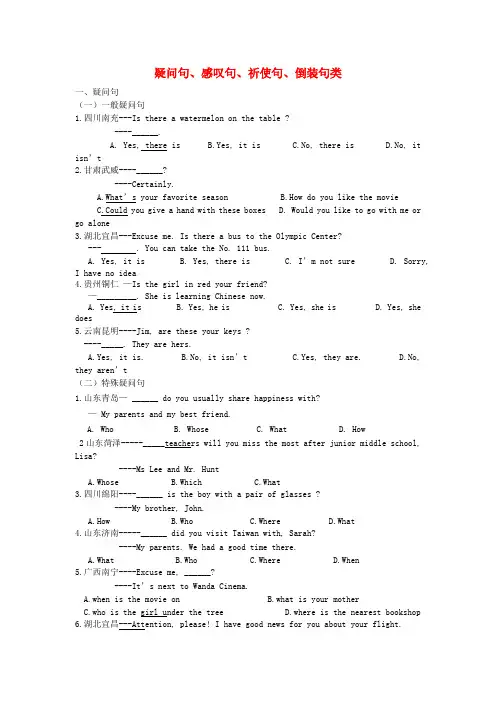
疑问句、感叹句、祈使句、倒装句类一、疑问句(一)一般疑问句1.四川南充---Is there a watermelon on the table ?----______.A. Yes, there isB.Yes, it isC.No, there isD.No, it isn’t2.甘肃武威----______?----Certainly.A.What’s your favorite seasonB.How do you like the movieC.Could you give a hand with these boxesD. Would you like to go with me or go alone3.湖北宜昌---Excuse me. Is there a bus to the Olympic Center?--- . You can take the No. 111 bus.A. Yes, it isB. Yes, there isC. I’m not sureD. Sorry,I have no idea4.贵州铜仁—Is the girl in red your friend?—_________. She is learning Chinese now.A. Yes, it isB. Yes, he isC. Yes, she isD. Yes, she does5.云南昆明----Jim, are these your keys ?----_____. They are hers.A.Yes, it is.B.No, it isn’tC.Yes, they are.D.No, they aren’t(二)特殊疑问句1.山东青岛— ______ do you usually share happiness with?— My parents and my best friend.A. WhoB. WhoseC. WhatD. How2山东菏泽-----_____teachers will you miss the most after junior middle school, Lisa?----Ms Lee and Mr. HuntA.WhoseB.WhichC.What3.四川绵阳----______ is the boy with a pair of glasses ?----My brother, John.A.HowB.WhoC.WhereD.What4.山东济南-----______ did you visit Taiwan with, Sarah?----My parents. We had a good time there.A.WhatB.WhoC.WhereD.When5.广西南宁----Excuse me, ______?----It’s next to Wanda Cinema.A.when is the movie onB.what is your motherC.who is the girl under the treeD.where is the nearest bookshop6.湖北宜昌---Attention, please! I have good news for you about your flight.--- ?A.What are theyB. Where is itC. How are youD. What is it7.黑龙江绥化---_____ did you write to last night ?----A pen pal.A.WhatB.WhereC.Whom8.山东东营 ----_______is your father?----He's an engineer in a big factory.A. WhoB. WhatC. WhichD. Where9.云南昆明----______?----Great! Everyone had fun.A.How was the school trip yesterdayB.How often do you exerciseC.Did you ride a horseD.Can you do the dishes10.云南----_____will the 2016 Summer Olympic Games be held in Brazil ?----In August.A.WhenB.HowC.WhyD.Where11.贵州毕节----______ do you often get to school , Michael?-----On foot.A.HowB.WhenC.WhatD.Where(三)反意疑问句1.江苏宿迁---There is a beautiful park near your school, _______?---Yes. I often go walking there.A.is thereB.isn’t thereC.are thereD.aren’t there2.贵州安顺He can hardly stay awake because he is so tired, _____ ?A.is heB.isn’t heC.can’t heD.can he3.湖南永州David never fights with his classmates , _____?A.does heB.doesn’t heC.isn’t he4.黑龙江龙东Let’s go to Disneyland in Shanghai in August, ______ ?A. shall weB. will youC. won’t you(四)选择疑问句1.山东济南---Bill, does your sister have brown hair or red hair ?----_____. She takes after my mother.A.Yes, she does.B.No, she doesn’tC.Brown hairD.I don’t know.2.吉林长春----Do you improve your spoken English by communicating with others or reading aloud?----________. I make lots of new friends in this way, too.A. Yes, I do.B. I like English very much.C. No, I don’t.D. By communicating with others.3.辽宁丹东Our mother’s birthday is coming .Do you want to buy a wallet or a scarf for her ?---______.She got a beautiful scarf last week.A.Yes, I do.B.No, I don’tC.A scarfD.A wallet二、感叹句1山东烟台 ----_____ weather it is ! Shall we go for a picnic ?----I can’t agree more.A. What a goodB. What goodC. How good theD. How good2.福建福州----_______ angry Kangkang looks!What happened ?---He found his mother reading his diary when he returned home yesterday.A. HowB.WhatC.What an3.湖南株洲 _____pleasant journey it is !A.HowB.WhatC.What a4.四川宜宾 ______fine weather we have today !A.What aB.HowC. What5.温州 ---Do you think the Terracotta Army in China is more than 2,000 years old? ---Wow! ______.A. How large it is !B. How modern it is !C. What a long history it has!D.What a beautiful it is !6.山东滨州----Jane won the first prize in the English speech contest.----_____ big progress she has made ! She used to be weak in English.A. HowB.How aC.WhatD.What a7.重庆B卷 --- TuYouyou has won the Nobel Prize.--- ______ great she is! We Chinese are so proud of her.A. What aB. WhatC. How aD. How8.新疆阜康、米泉_____ weather it is today! We’d better stay at home.A.What hotB.How hotC.What a hotD. How a hot9.连云港----_____heavy the rainstorm is !----Yes, the town has experienced the most serious flood during the past ten years.A.HowB.WhatC.How aD. What a10.四川巴中---A famous singer is going to hold a concert here in July.----Really? _____ exciting news!A.HowB.What anC.What11.江苏宿迁---Did you watch the China’s Military Parade on TV?---Yes. _______ great it was!A.HowB.WhatC.How aD. What a12.上海______ wonderful speech Emma gave at the UN conference!A.HowB.WhatC.What aD.What an13.山东济南----Making paper bottles ? Wow, _____great idea!----Thank you. We may use less plastic in this way.A.howB.whatC.what anD.what a14.陕西---Volunteers from Lantin Saving Team have saved many travellers in the mountains.----_______ they are !A.How great a manB.How great menC.What a great manD.What great men15.黑龙江齐齐哈尔The girl got the only chance to study abroad. _____ proud her parents felt!A.HowB.WhatC.What a16.湖北宜昌 ---The firemen did all their best to put out the fire.--- excellent firemen!A.WhatB. What anC. How anD. How17.湖北咸宁——The__________Brazil’s Olympic games will be held on August 5.——_________exciting news for the long summer vacation!A.thirty-one; How aB.thirty-first; WhatC.thirty-first; What anD.thirty-one; How18.江苏淮安______ great fun Andrew has ______ DIY in the art room with his classmates!A. What; doingB. What; doneC. How; doingD. How; done19.黑龙江绥化_____cold weather it is !A.How aB.What aC.What20.黑龙江龙东he temperature in June is still low. ______ bad the weather is!A. WhatB. HowC. What a21.吉林长春________ great news it is! We’ll have a school trip next week.A. What aB. WhatC. How aD. How22.吉林---Do you know some robots are able to serve as waiters in the restaurant?----Really ? ______ interesting it is !A.WhatB.What aC.How23.辽宁丹东---We are going to take part in Running Man.----______exciting news!A.WhatB.What anC.HowD.How an24.云南昆明----Have you watched the boat races this Dragon Boat Festival?----Yes. ______ wonderful races!A.What anB.What aC.WhatD.How25.云南______exciting boat race it was ! Many people watched it.A.What aB.What anC.HowD.How a26.新疆乌鲁木齐----_____exciting news it is the Disneyland in Shanghai has openedto the public!----______. We plan to go there this summer holiday.A.What an , So is itB.What, So it isC.How, So it isD.How, Sois it三、祈使句1.山东泰安:As we all know, life is short but amazing. ______it !A. EnjoyB. To enjoyC. EnjoyingD. Enjoyed2.四川攀枝花______ you r umbrella, or you’ll catch a cold on such a rainy day.A. TakeB. To takeC. TakingD.Taken3. 重庆B卷 --- Jack, don’t always copy what others do. ______ your head, please.--- Thanks for telling me.A. UsingB. UsedC. UsesD. Use4.山东济南 ______dressed now! We have to go in ten minutes.A.GettingB.GetC.To getD.Gets5.吉林长春________ me an e-mail before you come to Hangzhou. I’ll meet you at theairport.A. SendingB. To sendC. SendsD. Send6.贵州六盘水______late for the meeting, it’s impolite.A.NoB.NotC.Don’tD.Don’t be四、倒装句1.四川攀枝花----I think you are different now.----Of course, times have changed and _____.A.so have IB.so I haveC.neither have ID.neither I have2.黑龙江龙东I don’t know if you ______ to Mary’s party next Sunday. If you go, ______.A. go ; so will IB. will go ; so will IC. will go ; so do I3.新疆乌鲁木齐----_____exciting news it is the Disneyland in Shanghai has opened to the public!----______. We plan to go there this summer holiday.A.What an , So is itB.What, So it isC.How, So it isD.How, So is it参考答案:一、疑问句(一)、一般疑问句ACBCD(二)、特殊疑问句1--5:ABBBD;6---11:DCBAAA(三)、反意疑问句BDAA(四)、选择疑问句CDC二、感叹句1--5:BACCC; 6---10:CDAAC; 11---15:ACDDA; 16---20:BBBCB; 21---26:BCACBB三、祈使句AACBDD四、倒装句BBB。
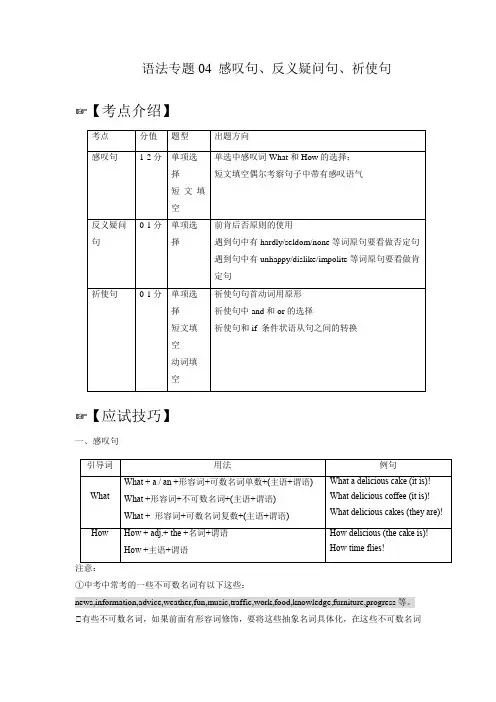
语法专题04感叹句、反义疑问句、祈使句☞【考点介绍】☞【应试技巧】一、感叹句①中考中常考的一些不可数名词有以下这些:news,information,advice,weather,fun,music,traffic,work,food,knowledge,furniture,progress等。
②有些不可数名词,如果前面有形容词修饰,要将这些抽象名词具体化,在这些不可数名词前加不定冠词a/an.如:What a great time we had last week!What a heavy rain!二、反义疑问句考点一:反意疑问句的类型1. 陈述句部分带有never, few, little, nothing, nobody, no, none, neither, seldom, hardly, too...to...等否含有定意义的词时,此陈述句为否定句,其附加疑问句要用肯定形式。
She never tells a lie, does she?He is too young to go to school, is he?注意:陈述句部分带有具否定含义的前缀时,该句不可被认为是否定句,依然是肯定句,疑问句部分仍然用否定形式。
如:He looks unhappy today, doesn’t he?2. 陈述句部分为There be句型时,疑问句部分用be there 形式。
如:There is a tree in front of our classroom, isn’t there?3. 陈述句部分的主语是指事或物的不定代词如:something, anything, nothing, everything时,附加疑问句部分的主语用it。
如:Something is wrong with the computer, isn’t it?4.陈述句部分的主语是指人的不定代词如:somebody (someone), anybody (anyone), nobody (no one), everybody (everyone)时,附加疑问句部分的主语用he或they,这时问句动词的数应和he或they一致。
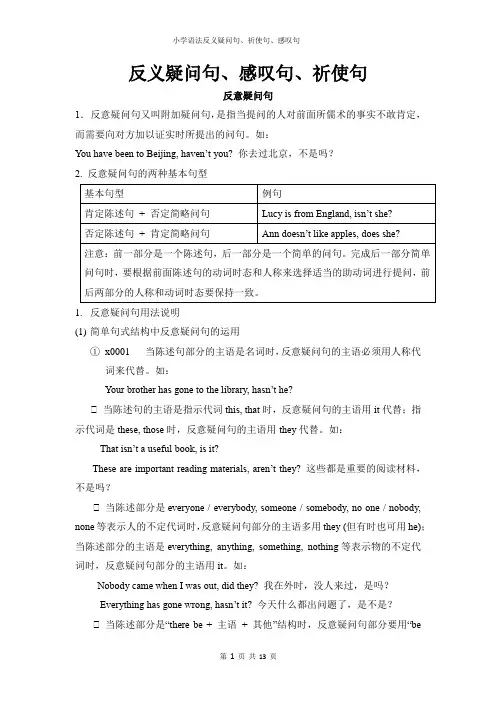
反义疑问句、感叹句、祈使句反意疑问句1.反意疑问句又叫附加疑问句,是指当提问的人对前面所儒术的事实不敢肯定,而需要向对方加以证实时所提出的问句。
如:You have been to Beijing, haven’t you? 你去过北京,不是吗?2. 反意疑问句的两种基本句型1.反意疑问句用法说明(1)简单句式结构中反意疑问句的运用①_x0001_当陈述句部分的主语是名词时,反意疑问句的主语必须用人称代词来代替。
如:Your brother has gone to the library, hasn’t he?② 当陈述句的主语是指示代词this, that时,反意疑问句的主语用it代替;指示代词是these, those时,反意疑问句的主语用they代替。
如:That isn’t a useful book, is it?These are important reading materials, aren’t they? 这些都是重要的阅读材料,不是吗?④ 当陈述部分是everyone / everybody, someone / somebody, no one / nobody, none等表示人的不定代词时,反意疑问句部分的主语多用they (但有时也可用he);当陈述部分的主语是everything, anything, something, nothing等表示物的不定代词时,反意疑问句部分的主语用it。
如:Nobody came when I was out, did they? 我在外时,没人来过,是吗?Everything has gone wrong, hasn’t it? 今天什么都出问题了,是不是?④ 当陈述部分是“there be + 主语+ 其他”结构时,反意疑问句部分要用“be(not) + there”结构。
如:There are some bananas in the basket, aren’t there?④ 当陈述部分有hardly (几乎不), seldom (很少), few (少,几乎无,修饰可数名词), little (很少,几乎无,修饰不可数名词), no, never (从不), nothing, nobody, nowhere等否定词或半否定词时,反意疑问句部分要用肯定形式。
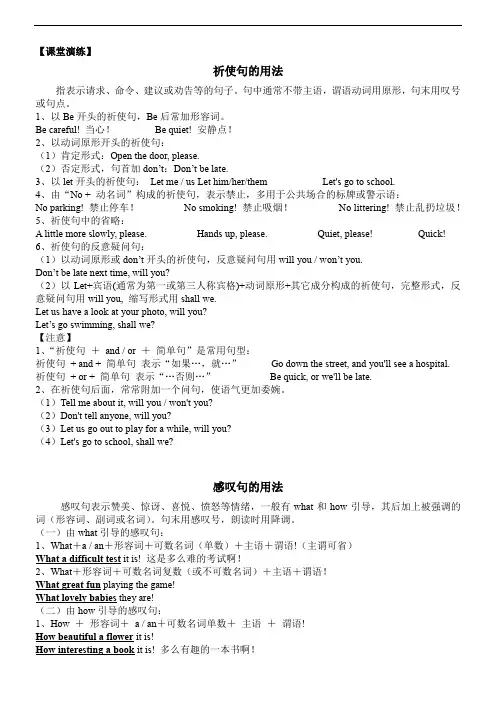
【课堂演练】祈使句的用法指表示请求、命令、建议或劝告等的句子。
句中通常不带主语,谓语动词用原形,句末用叹号或句点。
1、以Be开头的祈使句,Be后常加形容词。
Be careful! 当心!Be quiet! 安静点!2、以动词原形开头的祈使句:(1)肯定形式:Open the door, please.(2)否定形式,句首加don’t:Don’t be late.3、以let开头的祈使句:Let me/us Let him/her/them Let's go to school.4、由“No + 动名词”构成的祈使句,表示禁止,多用于公共场合的标牌或警示语:No parking! 禁止停车!No smoking! 禁止吸烟!No littering! 禁止乱扔垃圾!5、祈使句中的省略:A little more slowly, please. Hands up, please.Quiet, please! Quick!6、祈使句的反意疑问句:(1)以动词原形或don’t开头的祈使句,反意疑问句用will you / won’t you.Don’t be late next time, will you?(2)以Let+宾语(通常为第一或第三人称宾格)+动词原形+其它成分构成的祈使句,完整形式,反意疑问句用will you, 缩写形式用shall we.Let us have a look at your photo, will you?Let’s go swimming, shall we?【注意】1、“祈使句+and/or +简单句”是常用句型:祈使句+ and + 简单句表示“如果…,就…”Go down the street,and you'll see a hospital.祈使句+ or + 简单句表示“…否则…”Be quick,or we'll be late.2、在祈使句后面,常常附加一个问句,使语气更加委婉。
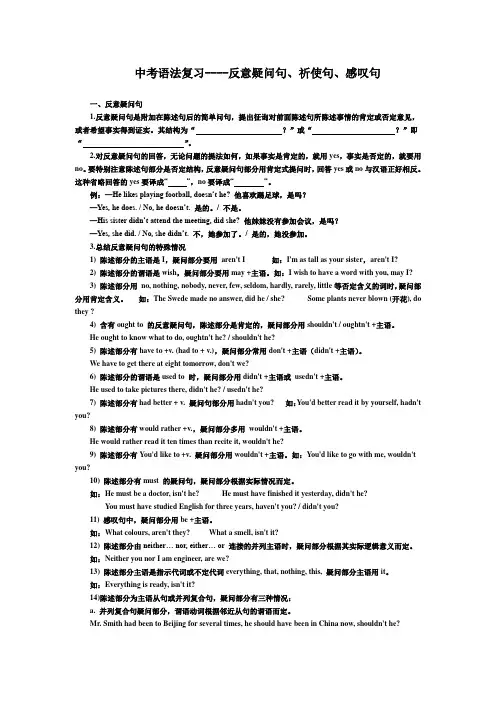
中考语法复习----反意疑问句、祈使句、感叹句一、反意疑问句1.反意疑问句是附加在陈述句后的简单问句,提出征询对前面陈述句所陈述事情的肯定或否定意见,或者希望事实得到证实。
其结构为“?”或“?”即“”。
2.对反意疑问句的回答,无论问题的提法如何,如果事实是肯定的,就用yes,事实是否定的,就要用no。
要特别注意陈述句部分是否定结构,反意疑问句部分用肯定式提问时,回答yes或no与汉语正好相反。
这种省略回答的yes要译成“”,no要译成“”。
例:—He likes playing football, doesn’t he? 他喜欢踢足球,是吗?—Yes, he does. / No, he doesn’t. 是的。
/ 不是。
—His sister didn’t attend the meeting, did she? 他妹妹没有参加会议,是吗?—Yes, she did. / No, she didn’t. 不,她参加了。
/ 是的,她没参加。
3.总结反意疑问句的特殊情况1) 陈述部分的主语是I,疑问部分要用aren't I 如:I'm as tall as your sister,aren't I?2) 陈述部分的谓语是wish,疑问部分要用may +主语。
如:I wish to have a word with you, may I?3) 陈述部分用no, nothing, nobody, never, few, seldom, hardly, rarely, little等否定含义的词时,疑问部分用肯定含义。
如:The Swede made no answer, did he / she? Some plants never blown (开花), do they ?4) 含有ought to 的反意疑问句,陈述部分是肯定的,疑问部分用shouldn't / oughtn't +主语。
中考英语语法祈使句感叹句反意疑问句(名师总结)中考英语语法祈使句、感叹句、反意疑问句(名师总结)名师讲义内部讲义,应该浏览自学!乏味英语语法用图表展现,学生们通俗易懂!中考英语语法:祈使句、感叹句、反意疑问句主谓一致单主对单谓语法一致原则单名单代不定式动名词+单复数名词或代词并作主语+为丛藓科扭口藓and,both...and...作主语+为丛藓科扭口藓morethanone/manya+单名+单意义一致原则复主对复谓就近一致原则and相连接的主语指同一人/物+单oreither...orneither...nornotonly...butalso时间、距离、金钱无论单复一律+单复形单意news,physics,maths,politics+单单形复意people,police+为丛藓科扭口藓with,but,except,besides,like不算数glasses,trousers,pants,gloves,shoes,scissors+复,pair决定anumberof+复名+复class,family,group,team,chinese,japanese整+单;个+为丛藓科扭口藓not...butall,some,any,half,enough,most,therest,(百)分数由名词定数therebe“the+形容词”表“一类人”+复thenumberof+复名+单”表中“夫妇/一“the+姓氏复数家”+复population+单,但粱分数+为丛藓科扭口藓each或复合不定代词+单oneof,eachof,noneof,eitherof,neitherof+单先行词作主语,同意的定从谓动单复数第1页共1页相信天道酬勤,学会笨鸟先飞!名师讲义内部讲义,值得下载学习!枯燥英语语法用图表展示,学生们通俗易懂! yaku表中命令/命令/建议等谓动用原形且常省主语若提人称,“,”分隔分类v原结尾考点答语反意疑问句please结尾中考避免连词成句用逗号ok,iwill.通常后加willyou?let结尾sorry,iwon’t.let’s...,shallwe?don’t开头letme/us/sb..,willyou?no+名词/动名词never+动原let’s/me+not+动原don’tlet+第三人称+动原第2页共2页相信天道酬勤,学会笨鸟先飞!名师讲义内部讲义,值得下载学习!枯燥英语语法用图表展示,学生们通俗易懂!感叹句what+a+可单+主+谓+其它!what+形+不可数+主+曰+其它!how+形+a/an+可单+主+谓+其它!表中赞美、赞叹、欢欣、等感情解题步骤what+a+形+肺痈+主+曰+其它!从后往前删帖主谓,参考所余最后一个词 what+an+形+可单+主+谓+其它!是名词就用what;否则用howwhat+形+复数+主+曰+其它!若用what,加不加a,取决于名词若用a,加不加an取决于形容词how+形+主+曰+其它!how+副+主+谓+其它!how+主+曰+其它!第3页共3页相信天道酬勤,学会笨鸟先飞!名师讲义内部讲义,值得下载学习!枯燥英语语法用图表展示,学生们通俗易懂!偏齿疑问句前后恰好相反时态一致人称替代前肯后指为,前否后特雷隆与前半句适当的助动、be颤抖和情态动词必须用人表示代词never,seldom,little,few,hardly也表中驳斥’s(1)is(2)has’d(1)would(2)hadiam…,aren’ti?somethingis…,isn’tit?驳斥后缀,算不上驳斥have在前句中就是v实还是v并助,看看其后存有donesomebodyis…,isn’the?/aren’tthey?too...to...算是驳斥,so...that.算是确实therebe….,bethere?therewillbe…,won’tthere?注意事项含有推测的句子think答语先回去推断(不回去not),再搞偏齿疑问句ithink...偏齿疑问句以从句为依据,主句的驳斥归属于从句;其它人think反之原则:实话实说:上句译作为“与否”,下句此事与否有误。
祈使句定义:用于表达命令、请求、劝告、警告、禁止等的句子叫做祈使句,祈使句最常用于表达命令。
祈使句因对象(即主语)是第二人称,所以通常都省略。
祈使句的动词都为一般现在时,句末则使用句号来表示结束。
一、祈使句的肯定句式1.祈使句的肯定句式一般分为以下三种类型:①实意动词原形+其它成分Stand up!Close the door, please.① Be动词+其它成分(形容词、名词或介词短语等)Be quiet,please./Please be quiet.① Let+宾语+动词原形+其它成分Let me help you.2. 祈祈使句的否定句式,通常情况下在句首加上Don’t或Never①在祈使句的肯定句式前加Don’Don't forget me!①在Be动词引起的肯定祈使句前加Don’tDon't be late for school!③Let型的否定式有两种:Let +us(me/him/her/it/them)+ not+ 动词原形Don’t let +us(me/him/her/it/them)+动词原形Let’s not say anything about it.Don’t let him go alone.3.No+名词/V-ing形式结构,表示禁止做某事。
例如:No fishing!No smoking!No photos!4.以may为句首的表示祝愿的祈使句.May you + 动词原形1) 祝你成功!May you succeed!2) 祝你一路平安!May you have a safe journey!5.don’t/doesn’t/didn’t后跟动词原形Please后跟动词原形练习:单项选择1. ________ stand too close to North Americans. Give them more personal space.A. Aren'tB. Didn'tC. Won'tD. Don't2. ---Is there a No. 2 bus stop near here?---Yes, there is. __________ at the second crossing, and you will find it.A. Turning leftB. Turn leftC. To turn leftD. Turns left3. —________. The baby is sleeping. I'm sorry.A. Not talkB. Not talkingC. Don't talkD. Can't talk4. — _______ late for school again, Tim! — Sorry, I promise that I _______.A. Don’t; won’tB. Don’t be; won’tC. Don’t be; don’tD. Don’t; will5. Don’t ___ shy. Everyone may make mistakes at the beginning.A. amB. isC. beD. are6. Please . The boy is studying.A. not noisyB. don’t noisyC. not to be noisyD. don’t be noisy7. —I’m leaving now. —________ you turn off the lights and the computer.A. To make sureB. Make sureC. Made sureD. Making sure8. Tony, ________, or you will get heavier.A. doesn't play sports any moreB. doesn't eat so much meatC. don't play sports any moreD. don't eat so much meat9. Don’t _______ too much TV. It’s bad for your eyes.A. watchingB. to watchC. watchD. watches10. —Would you please _______ near the river? Oh, sorry, I won’t.A. not playB.don’t playC. not to play11. — Please don’t make a noise. — ________ . I’ll be as quiet as a mouse.A. Yes, I doB. No, I don’tC. Yes, I willD. No, I won’t12. — ______, please.K-E-Y.A. What’s thisB. Spell itC. Can you spell itD. What is it13. _________ play in the street. It’s very dangerous.A. DoB. NotC. Don’tD. Doesn’t14. climb the tree! It’s too small. Come down quickly!A. Don’tB. Isn’tC. Aren’tD. Do15. —Don’t forget to close the door after school. — ________.A.OK, I won’tB.OK, I will.C.Yes, I do.D.No, I don’t.16. ---Sorry for being late again. ---__________here on time next time, or you’ll be punished.A. BeB. BeingC. To beD. Been17. _____ drive too fast .We have enough(足够的)time to get there.A. NotB. Don’tC. doesn’t18. Boys and girls, _____in bed. It’s bad for your eyesA. not readB. doesn’t readC. no readD. don’t read感叹句感叹句:表示赞美、惊叹、喜悦等感情;表达喜、怒、哀、乐、惊、恐等强烈情绪;感叹句分为两种:一种以what引导,一种以how引导。
专题11 祈使句,反意疑问句和感叹句【考纲解读】从近几年的高考题可以看出,在四种简单句型中,考查的重点比较集中,主要考查反意疑问句和祈使句。
作为考查点,在全国卷及地方卷单项填空中每年都以灵活、多变的形式出现。
根据英语语言特点、简单句的考查今后仍是热点。
考查的重点是:祈使句和含有宾语从句的主从复合句的反意疑问句及句尾的附加成分等。
主要考点有:1. 祈使句的判断2. 祈使句固定结构3. 反意疑问句一般用法及特殊用法【知识要点】一、简单句只有一个主语(或并列主语)和一个谓语(或并列谓语)的句子叫简单句。
按照句子的功能,简单句可分为4类:陈述句、疑问句、祈使句、感叹句。
其中陈述句中的否定式、疑问句中的反意疑问句以及感叹句的结构多为考查重点,应重点掌握。
以下将对此作重点分析。
1.陈述句陈述句包括肯定式和否定式两种(肯定式暂略)。
注意以下有关否定结构的问题:He had hardly any schooling before liberation.Not both of them want to go.(=Both of them don’t want to go.)All that——hope和be afraid的肯定和否定答语分别为:I hope so./I hope not.及I’m afraid so./I’m afraid not.2.疑问句疑问句分为一般疑问句、特殊疑问句、选择疑问句和反意疑问句。
现主要介绍反意疑问句构成。
形式:句子+简短的疑问句(1)前面若有多个句子并列,则以最后一个句子为准;若前面部分为主从复合句,一般来说,以主句为准;但若主从复合句的主句谓语动词是think,believe,suppose,guess等,主语又是第一人称且为一般现在时、谓语又没有任何副词修饰时,简短疑问部分的动词、时态、人称则以从句为准,而肯、否定形式依主句而定。
(2)前面句子含有must,can’t,may等表推测的词时,疑问部分则依据句子的时态及时间状语而定。